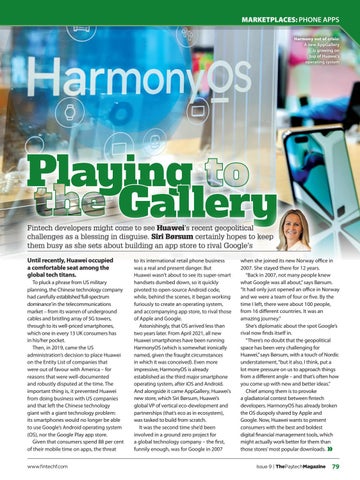MARKETPLACES: PHONE APPS Harmony out of crisis: A new AppGallery is growing on top of Huawei’s operating system
Fintech developers might come to see Huawei’s recent geopolitical challenges as a blessing in disguise. Siri Børsum certainly hopes to keep them busy as she sets about building an app store to rival Google’s Until recently, Huawei occupied a comfortable seat among the global tech titans. To pluck a phrase from US military planning, the Chinese technology company had carefully established ‘full-spectrum dominance’ in the telecommunications market – from its warren of underground cables and bristling array of 5G towers, through to its well-priced smartphones, which one in every 13 UK consumers has in his/her pocket. Then, in 2019, came the US administration’s decision to place Huawei on the Entity List of companies that were out of favour with America – for reasons that were well-documented and robustly disputed at the time. The important thing is, it prevented Huawei from doing business with US companies and that left the Chinese technology giant with a giant technology problem: its smartphones would no longer be able to use Google’s Android operating system (OS), nor the Google Play app store. Given that consumers spend 88 per cent of their mobile time on apps, the threat www.fintechf.com
to its international retail phone business was a real and present danger. But Huawei wasn’t about to see its super-smart handsets dumbed down, so it quickly pivoted to open-source Android code, while, behind the scenes, it began working furiously to create an operating system, and accompanying app store, to rival those of Apple and Google. Astonishingly, that OS arrived less than two years later. From April 2021, all new Huawei smartphones have been running HarmonyOS (which is somewhat ironically named, given the fraught circumstances in which it was conceived). Even more impressive, HarmonyOS is already established as the third major smartphone operating system, after iOS and Android. And alongside it came AppGallery, Huawei’s new store, which Siri Børsum, Huawei’s global VP of vertical eco-development and partnerships (that’s eco as in ecosystem), was tasked to build from scratch. It was the second time she’d been involved in a ground zero project for a global technology company – the first, funnily enough, was for Google in 2007
when she joined its new Norway office in 2007. She stayed there for 12 years. “Back in 2007, not many people knew what Google was all about,” says Børsum. “It had only just opened an office in Norway and we were a team of four or five. By the time I left, there were about 100 people, from 16 different countries. It was an amazing journey.” She’s diplomatic about the spot Google’s rival now finds itself in. “There’s no doubt that the geopolitical space has been very challenging for Huawei,” says Børsum, with a touch of Nordic understatement, “but it also, I think, put a lot more pressure on us to approach things from a different angle – and that’s often how you come up with new and better ideas.” Chief among them is to provoke a gladiatorial contest between fintech developers. HarmonyOS has already broken the OS duopoly shared by Apple and Google. Now, Huawei wants to present consumers with the best and boldest digital financial management tools, which might actually work better for them than those stores’ most popular downloads. Issue 9 | ThePaytechMagazine
79
